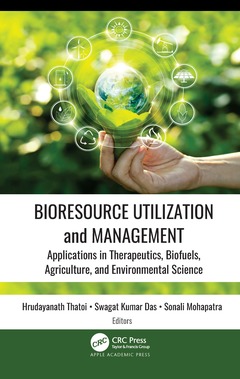Bioresource Utilization and Management Applications in Therapeutics, Biofuels, Agriculture, and Environmental Science
Coordonnateurs : Thatoi Hrudayanath, Das Swagat Kumar, Mohapatra Sonali

The need for exploration, conservation, and sustainable utilization of bioresources is undeniable for the survival and growth of mankind. This new book throws light on new and recent research on and development of effective strategies for sustainable utilization of bioresources using modern tools and techniques to help meet this challenge. This volume addresses the utilization of bioresources in therapeutics, in biofuel, in agriculture, and in environmental protection. Beginning with the diverse potential applications of bioresources in food, medicine, and cosmetics, the volume goes on to address the various different underutilized bioresources and their sustainable uses. It discusses important advances in biofuel and patents that highlight recent developments that address the energy crises and the continuously fluctuating cost of petroleum. It explores new renewable energy sources from bioresources and their sustainable utilization in the bioenergy and biofuel industry.
Several chapters focus on the sustainable utilization of bioresources in the agricultural sector. The volume considers that developing countries have huge agricultural resources that could be employed for production of value-added byproducts for the sustainable development of a bio-based economy. The book discusses efficient use of underexploited natural bioresources, new chemical approaches for the generation of novel biochemicals, and the applications of genetics approaches for bioresource conservation and production of value-added products. Further, strategies for the production of biopesticides utilizing bioresources are also discussed.
Part I: Utilization of Bioresources In Therapeutics 1. Antifungal Drugs from Endophytic Microbes: Present and Future Prospects 2. Bioactive Compounds and Herbal Therapy for Alzheimer’s Disease 3. Wild Cucurbits: An Ethnomedicinally Important Plant Species for Aboriginals of the Similipal Biosphere Reserve, Odisha, India 4. The Miracle Plant—Moringa 5. Biomedical Application of Polymeric Biomaterial: Polyhydroxybutyrate 6. Thermostable Cyclodextrin Glycosyltransferase (CGTase): Recent Advances in Pharmaceutical Application of Cyclodextrins and Their Enzymatic Production 7. Mangrove Plants in Therapeutic Management of Diabetes: An Update Part II: Utilization of Bioresources In Biofuel 8. Microalgae as a Viable Bioresource for Sustainable Biofuel Production through Biorefinery Technologies 9. Fruit Peel Waste “Biorefinery” and Sustainability Issues 10. Utilization of Bioresources: Towards Biomass Valorization for Biofuels 11. Lignocellulosic Waste-Derived Bioethanol as Potential Biofuel for the Transportation Sector: Sources and Technological Advancements 12. Cost-Effective Production of Biofuels from Lignocellulosic Biomass: Prospects and Challenges 13. Monitoring Innovations in Biofuel Production from Lignocellulosic Biomass: A Patent-Based Approach Part III: Utilization of Bioresources In Agriculture 14. Effective Utilization of Palm Mesocarpic Husk: An Agrowaste in Producing Major Phenolics and Other Chemicals 15. CRISPR/Cas9: An Invention for Plant Breeding and Agricultural Sustainability 16. Self-sustained Ramie Cultivation in Tripura, a Source of Multiple Commercial Uses for Adoption as an Alternative Livelihood 17. Azolla: A Viable Resource of Biofertilizer and Livestock Feed for Sustainable Development of Farming Community Part IV: Utilization of Bioresources in the Environment 18. Bioremediation of Arsenic-Contaminated Environment Using Bacteria: An Update 19. Potential Applications of Coal Fly Ash: A Focus on Its Fungistatic Properties and Zeolite Synthesis 20. Heavy Metal Toxicity and Their Bioremediation Using Microbes, Plants, and Nanobiomaterials 21. Spent Coffee Waste Conversion to Value-Added Products for the Pharmaceutical and Horticulture Industry 22. Bioremediation: An Ecofriendly Technology for Sustainable Aquaculture 23. Biochar: An Advanced Remedy for Environmental Management and Water Treatment
Hrudayanath Thatoi, PhD, is a Professor in the Department of Biotechnology of North Orissa University, Baripada, India, where he is also working as the Director of the Centre for Similipal Studies. He has initiated several research projects funded by UGC-DAE Govt. of India, DST Govt. of Odisha, and Forest Department, Govt. of Odisha. To date, Dr. Thatoi has published books, including two textbooks, and more than 250 research papers, proceedings of conferences, and book chapters. He serves as member of several scientific societies and editorial boards of the national and international journals. He is a Fellow of the Society of Applied Biotechnology.
Swagat Kumar Das, PhD, is an Assistant Professor in the Department of Biotechnology at College of Engineering and Technology at Biju Patnaik University of Technology, Odisha, India. He has more than nine years of teaching experience and has published over 20 research and review articles as well as several book chapters. He has also co-authored two books. His research activities involve phytochemical analysis and drug development from mangrove plants for diabetes and oxidative stress.
Mrs. Sonali Mohapatra is an Assistant Professor in the Department of Biotechnology, CET, Bhubaneswar, India, and is pursuing her PhD at the College of Engineering and Technology, Ghatika, India. She has been working on biofertilizer production using industrial waste biomass as well as on a metabolomics approach for improving the ethanol tolerance capacity of ethalogenic microorganisms. Mrs. Mohapatra has published more than 15 original research papers in reputed international journals and eight international book chapters and has filed one patent to date.
Date de parution : 10-2021
15.6x23.4 cm
Disponible chez l'éditeur (délai d'approvisionnement : 15 jours).
Prix indicatif 180,83 €
Ajouter au panierThèmes de Bioresource Utilization and Management :
Mots-clés :
CRISPR RNA; Lignocellulosic Biomass; Moisture Content; Energy Sources; Bioethanol Production; Sea Water; Biorefinery Approach; Arsenic Resistant Bacteria; Moringa Seed; Endophytic Fungus; Late Onset Ad; CRISPR Cas System; CRISPR Locus; Lignocellulosic Waste Biomass; Moringa Plants; Ethanolic Leaf Extract; Algal Biorefinery; Endophytic Bacteria; Ad Patient; NaOH Pretreatment; Microbotryum Violaceum; Biochar Production; Lipopoly Saccharides; PLA Nanoparticles; Ethanol Bark Extract



